-
Policy positions
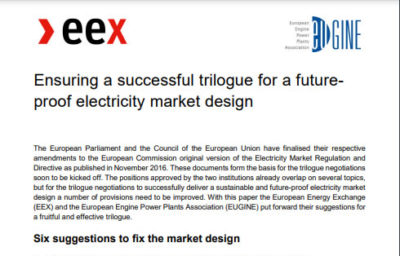
EUGINE – EEX joint position paper on the electricity market design
Ensuring a successful trilogue for a future-proof electricity market design The European Parliament and the Council of the European Union have finalised their respective amendments to the European Commission original version of the Electricity Market Regulation and Directive, as published in November 2016. These documents form the basis for the trilogue negotiations between the three […]
19 Jul 2018
-
Policy positions
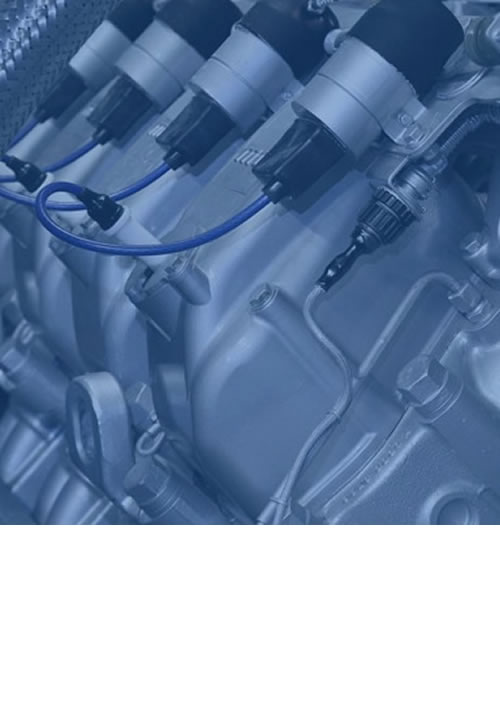
EUGINE contributes to the consultation on ETS Reform
EUGINE strongly supports the principle of a market-based mechanism aiming at progressively decarbonising the EU economy. However, the EU ETS Directive should strongly contribute to the modernisation of the EU power system. It should take into account the major changes which have been occurring in the last few years, including the remarkable development of intermittent […]
26 Apr 2018
-
Policy positions

EUGINE contributes to the CEN SFGas GQS Simple Scenario Assessment
Power plants using reciprocating gas engines are important “end users” of the gas grid. The gas quality is of essential importance for the safety, environmental performance and efficiency of these gas engine power plants. Against this background, EUGINE contributed to the work undertaken by the CEN SFGas WG “Pre-normative Study of H-Gas Quality Parameters” and […]
16 Apr 2018
-
Policy positions

Brexit/Energy: high time to tackle a myriad of concrete problems
The United Kingdom’s decision to withdraw from the European Union, the so-called “Brexit”, is once again on the agenda of the two EU co-legislators this week (European Parliament) and next week (European Council). The United Kingdom is a key country for the European manufacturers of engine power plants, both in terms of production and sales. […]
26 Mar 2018
-
Policy positions
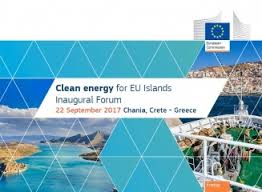
Clean energy for all EU Islands: the contribution of engine power plants
EUGINE welcomes the ‘Clean Energy for EU Islands’ initiative aiming at modernising the energy supply of the more than 2200 inhabited EU islands. EUGINE shares the European Commission’s view that “islands have the potential to be natural winners and leaders in demonstrating new technologies and innovative solutions to achieving the clean energy transition”. Engine power […]
12 Feb 2018
-
Policy positions
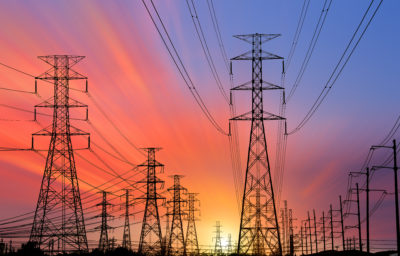
IGDs on frequency: EUGINE contribution to the ENTSO-E consultation
EUGINE’s Task Force Connection Network Codes contributed to the ENTSO-E consultation on the Implementation Guidance Documents regarding Frequency Stability Parameters.
12 Feb 2018
-
Policy positions

EUGINE joins industry coalition for an ambitious EU industrial strategy
EUGINE has signed a common declaration of a large coalition of European industry associations, requesting the European Commission to come up with a strategy and an action plan on how to better support the European manufacturing sector. The declaration is a reminder to policy makers to not forget the potential of the manufacturing sector as […]
02 Jun 2017
-
Policy positions

Power-to-Gas: Balancing the energy system with green fuel
Due to the ongoing energy transition, increasing shares of variable renewable energy sources (V-RES) only producing electricity when the sun is shining or the wind is blowing are being introduced into the energy mix. This variability generates an increasing challenge: how to balance tomorrow’s energy system in a secure, cost-efficient and sustainable way. Power-to-Gas in […]
23 May 2017
-
Policy positions

Electricity balancing: EUGINE’s feedback on the draft guideline
EUGINE is the centre of knowledge for engine power plant technology and electricity market design. Its members are the leading European manufacturers of engine power plants and their key components. As flexible, energy-efficient, reliable and environmentally sound technology, engine power plants are an optimal solution to offset growing variations and ensure security of supply. The […]
18 Jan 2017
-
Policy positions

EUGINE Position on the negotiations for a WTO Environmental Goods Agreement
EUGINE supports the inclusion of engines and alternators for engine power plants in the planned WTO Environmental Goods Agreement. Engine power plants can be run burning biogas or biofuels, increasing the share of renewable in the electricity system. In addition flexible gas engine power plants are enablers for the integration of more variable renewable energy […]
27 Jul 2016
-
Policy positions

Capacity mechanisms: EUGINE contribution to the public consultation
The fact that 28 capacity mechanisms were found in the 11 countries selected by DG Competition shows to what extent the internal market threatens to be distorted and undermined by purely national considerations. EUGINE regards this sector inquiry as a key exercise to take stock of the current situation and then fix the problems in […]
13 Jul 2016
-
Policy positions
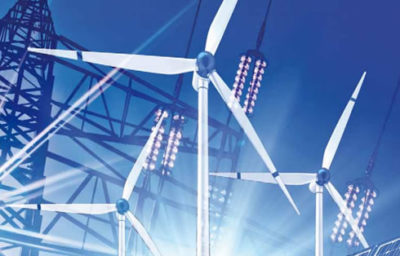
Designing Electricity Markets – EUGINE recommends solutions for a Successful Energy Transition
To achieve a succesful European energy transition at minimum cost, EUGINE recommends solutions which are European-wide, based on market forces and empowering market players: EUGINE – Background Paper on Designing Electricity Markets for a Successful Energy Transition
09 Oct 2015
-
Policy positions
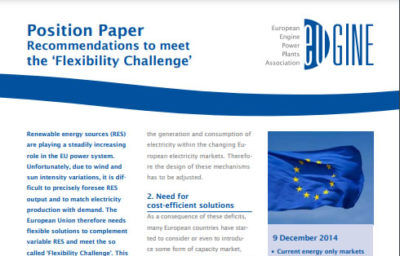
Position Paper – Recommendations to meet the “Flexibility Challenge”
Renewable energy sources (RES) are playing a steadily increasing role in the EU power system.Unfortunately, due to wind and sun intensity variations, it is difficult to precisely foresee RES output and to match electricity production with demand. The European Union therefore needs flexible solutions to complement variable RES and meet the so-called ‘Flexibility Challenge’. This […]
09 Oct 2015
-
Policy positions

Position Paper – Directive on emissions from Medium Combustion Plants (MCPs)
EUGINE requests major modifications of the proposal for an MCP directive targeting power plants with a rated thermal input between 1 and 50 MW. Main changes concern the scope, definitions and limit values. As engine power plants are needed to achieve the decarbonisation of Europe’s power generation, negative impacts on this technology should be avoided.
11 Sep 2015
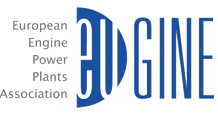

